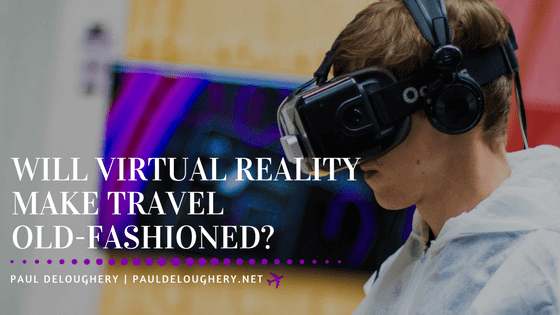By 2026, virtual reality will be found everywhere. This is according to futurist Peter Diamandis. Parents will complain that their kids are constantly off in another universe. He also predicts that travel will start to decline as VR (virtual reality) gets good enough to experience many of the sensations of a place without the hassle of travel.
Personally, I’m open to experiencing VR. But I don’t think VR will ever take the place of travel. Here are 4 things that travel does for me that I don’t think VR will be able to replace:
- Getting in touch with yourself. I remember spending a night sleeping in the airport in Kiev, Ukraine waiting for my flight. I was there for 17 hours. After the two cafes closed in the evening, there was nothing to do but be alone with my thoughts. I didn’t speak Russian, so I couldn’t even carry on a conversation with anyone. I was bored for part of the time. But there’s something about being forced to do nothing for hours. One gets bored of being bored. Instead, you learn to just be with yourself. There were more eventful experiences on the trip. But this experience is the one that most impacted me.
- Appreciating your life. I had an apartment in Sherman Oaks, California for two months. I had gone there to spend time with a personal development coach by the name of Kyle Cease. But he flaked out after about three weeks, and I had to find other things to do. In the process, I feel like I experienced what it would be like to live in the Los Angeles area. And … when I returned to Arizona, I felt a huge relief. The Phoenix traffic that used to upset me, now seemed like nothing. I had a new appreciation for the space between the houses and the friendly people. And I really appreciated being with my kids again. We seemed closer because of the time apart.
- Building and strengthening relationships. I’m going to stick my neck out on this one. I imagine that a VR travel program could have you meet people and become imaginary friends with them. This would be akin to developing a bond with a character on a television series. But it wouldn’t be real. I’m not a psychologist, but I think there is a distinct difference between having to form a relationship with a real human, compared to having an imaginary (idealized) relationship.
- Having an adventure. A VR program will have a finite number of options. It might allow for pre-programmed “chance” meetings with simulated people. But this is not the same as the synchronicities that happen in real life. I’ll give you a real example from my own life. I was on a trip to Naples, Italy in 2015. An American colleague asked a local girl to take the ferry to the Isle of Capri the next day. I asked him if his date had a friend. And she did. My date was from Ukraine, but was working in Naples. After spending the day on Capri, she and I spent the next two days together before I had to return to the States. She said she wouldn’t carry on a long-distance relationship for very long. If I wanted a relationship with her, I would need to visit her regularly. And so I did. I went to see her in July 2015. Then in August, she had to return to Ukraine, so I visited her there. I also took trips in September and November to see her. Then in January, 2016, I went to accompany her to the States so we could get married. VR is different from such a real experience.
What do you think? Will virtual reality take away your desire to travel?

